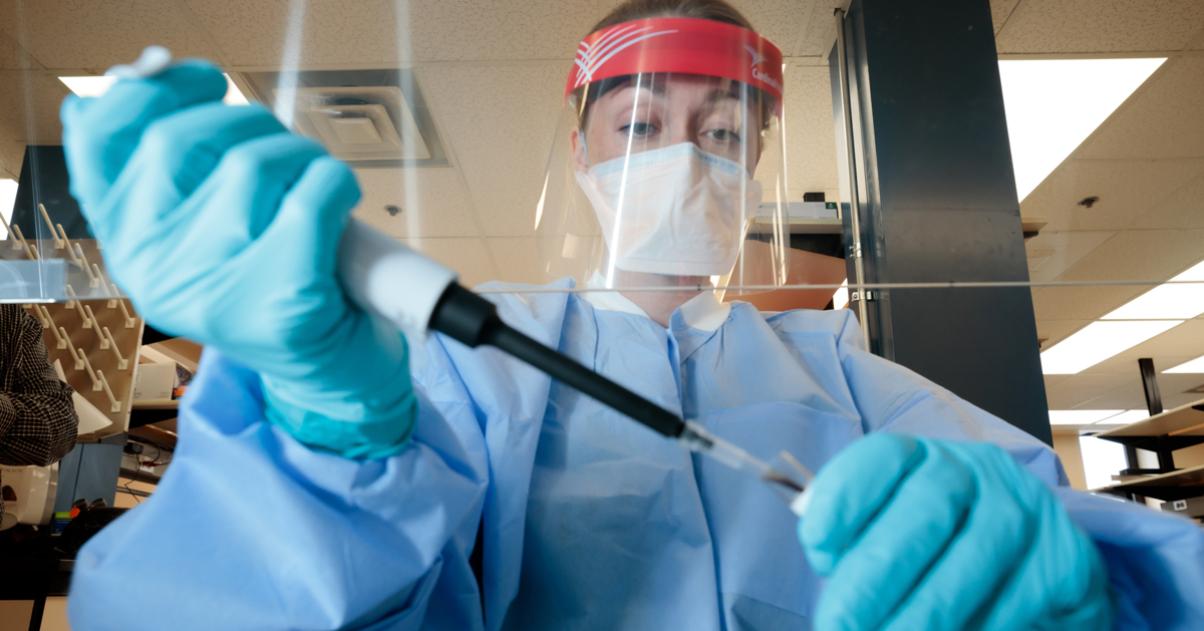PCR test recall: Can PCR tests tell the difference between COVID-19 and the flu?

Back in July 2021, the Centers for Disease Control and Prevention (CDC) voluntarily recalled a PCR test they'd been using.
The recall was not because the polymerase chain reaction (PCR) test was inaccurate. It was because they have a different test that can check for both influenza and COVID-19 simultaneously – which is known as the "multiplexed method."
We caught up with pathologist and microbiologist Jana Broadhurst, MD, PhD, to understand what this means for testing accuracy. Dr. Broadhurst is director for the Nebraska Biocontainment Unit Clinical Laboratory and Emerging Pathogens Laboratory.
A brief summary of what happened:
- The CDC's original PCR test has been voluntarily recalled in favor of a more efficient multiplex PCR test
- The CDC's original PCR test gave accurate, dependable results. It was not recalled because of accuracy (sensitivity or specificity) concerns
- All PCR tests for COVID-19 are designed to only give positive results if SARS-CoV-2 (the virus that causes COVID-19) is present
- PCR tests are more accurate and reliable than antigen tests
Does the recall mean the original CDC PCR test gave inaccurate results?
No. The PCR test was extraordinarily accurate in identifying the right virus: SARS-CoV-2.
"Just because the original test wasn't built to detect influenza doesn't mean that it wasn't accurately reporting results," Dr. Broadhurst explains. "We can be very confident that a positive result from a PCR test represents a true case of SARS-CoV-2 because of how these tests were designed."
Did previous PCR tests confuse COVID-19 cases for influenza cases?
Not at all. "The reported numbers were based on highly accurate laboratory tests," says Dr. Broadhurst. "The original test could detect the presence of SARS-CoV-2 with very high specificity," – meaning the test does its job very well.
A PCR test is an excellent identifier of COVID-19 cases, because of something called specificity. Basically, specificity means that the test is designed to only detect one type of virus. Dr. Broadhurst says, "The PCR test is validated against many different coronaviruses and common respiratory viruses, including influenza so that it would not give false-positive results." Meaning, researchers subjected the test to many different samples to see if it would give the wrong result. It correctly identified SARS-CoV-2 out of all of these samples.
So why did the CDC recall the PCR test?
The CDC is choosing to use a multiplexed PCR test rather than the original PCR test to save time.
All PCR tests give either a positive or negative result for each virus it detects. For SARS-CoV-2:
- Positive means the test found SARS-CoV-2, the virus that causes COVID-19
- Negative means you likely don't have COVID-19 – but you may have influenza or another coronavirus. So you'd have to get a second test to see if it's something else
But a multiplexed test can determine both viruses at the same time, saving the patient an uncomfortable nasal swab.
Which is a more accurate test for detecting COVID-19 – PCR or antigen?
PCR tests are more accurate than antigen tests. "PCR tests are the gold standard for detecting SARS-CoV-2," says Dr. Broadhurst. "It is the most accurate testing modality that we have. And now many PCR tests can detect both SARS-CoV-2 and influenza at the same time."
How do we know COVID-19 cases aren't actually influenza?
Every PCR test must be validated, meaning checked for its sensitivity and specificity. The Nebraska Medicine PCR test has been extensively vetted with multiple ways of validation.
Dr. Broadhurst explains, "At the beginning of the pandemic, we went through a very rigorous process. That includes demonstrating the specificity of the test to exclude anything that may cause a false positive."
Dr. Broadhurst, microbiologist Paul Fey, PhD, microbiology fellow Hannah Creager, PhD, and other experts worked together to ensure a trustworthy test. To ensure specificity, they tested clinical samples and also used databases of genetic sequences.
- Our researchers took clinical samples from before Nebraska had community spread of COVID-19 and ran the samples through the test. These clinical samples included known results of influenza and other common viruses. The PCR test reported negative on all of them, which makes sense.
- Researchers also looked through large databases of viral genetic sequences – the building blocks of a virus. That way, they ensured the PCR test only picked up a piece unique to SARS-CoV-2 and not another coronavirus or influenza. "Comparing these genetic sequences means we can avoid cross-reactivity," says Dr. Broadhurst.
Have the criteria for a positive PCR test changed, making PCR tests report fewer COVID-19 cases?
No. This World Health Organization (WHO) notice did not change the criteria for a positive COVID-19 test.
You may have heard rumors about something called the "cycle threshold" being changed. The WHO notice was simply reaffirming that test results must be appropriately analyzed, and that some tests may need to be repeated to confirm the result, which is a common practice. It doesn't mean that PCR tests with higher cycle thresholds are invalid or inaccurate.
The bottom line: PCR tests remain the gold standard for detecting an active COVID-19 infection. The tests have accurately detected COVID-19 cases since the pandemic began. Highly trained clinical professionals are skilled at correctly interpreting PCR test results and notices like this one from the WHO.





